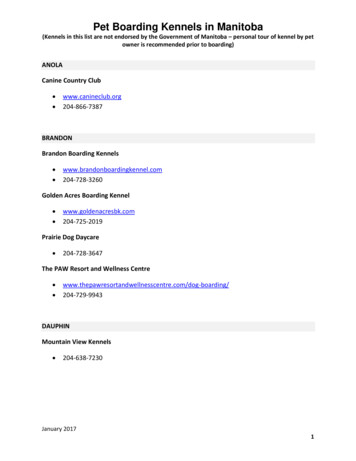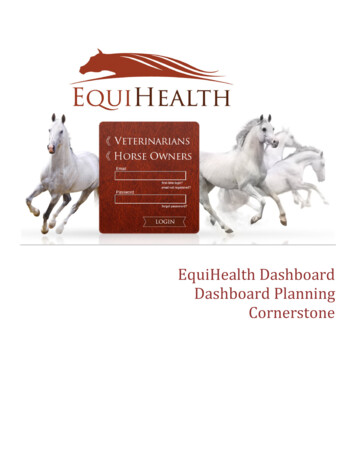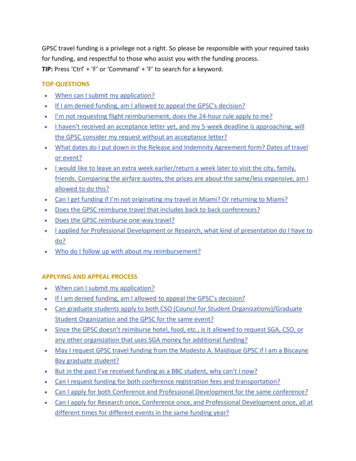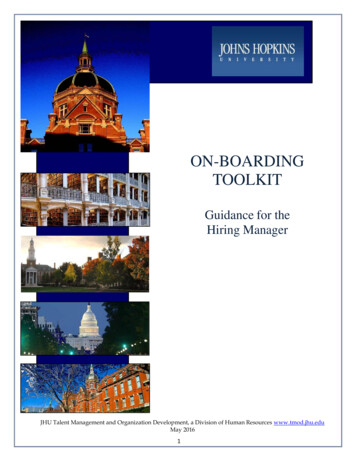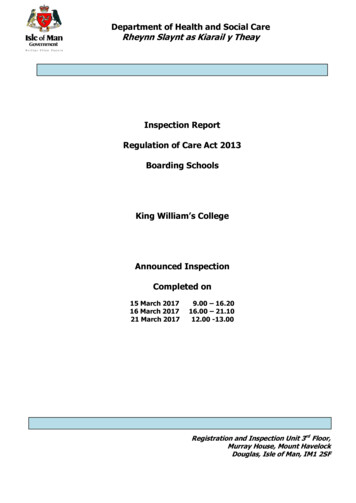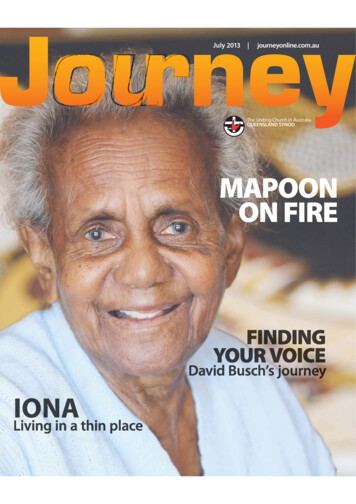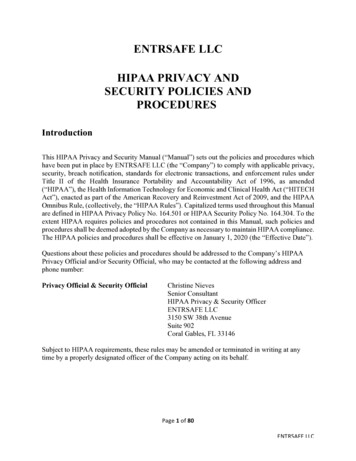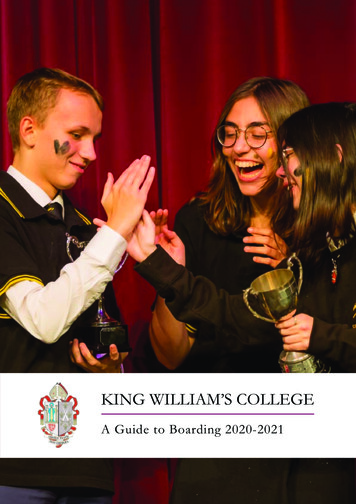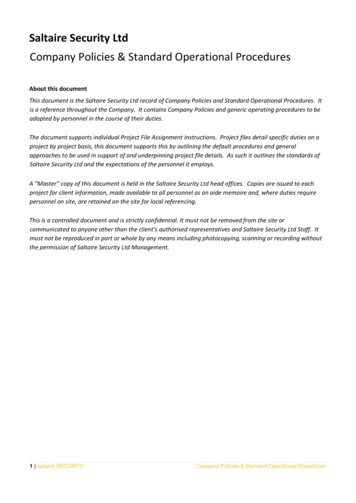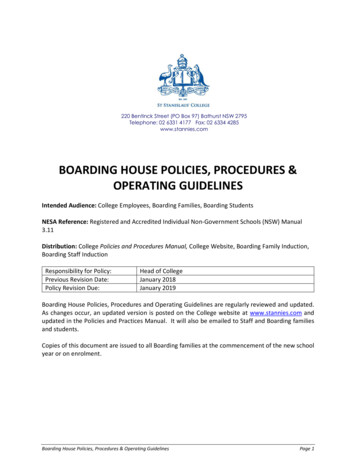
Transcription
220 Bentinck Street (PO Box 97) Bathurst NSW 2795Telephone: 02 6331 4177 Fax: 02 6334 4285www.stannies.comBOARDING HOUSE POLICIES, PROCEDURES &OPERATING GUIDELINESIntended Audience: College Employees, Boarding Families, Boarding StudentsNESA Reference: Registered and Accredited Individual Non-Government Schools (NSW) Manual3.11Distribution: College Policies and Procedures Manual, College Website, Boarding Family Induction,Boarding Staff InductionResponsibility for Policy:Previous Revision Date:Policy Revision Due:Head of CollegeJanuary 2018January 2019Boarding House Policies, Procedures and Operating Guidelines are regularly reviewed and updated.As changes occur, an updated version is posted on the College website at www.stannies.com andupdated in the Policies and Practices Manual. It will also be emailed to Staff and Boarding familiesand students.Copies of this document are issued to all Boarding families at the commencement of the new schoolyear or on enrolment.Boarding House Policies, Procedures & Operating GuidelinesPage 1
Boarding House – Policies, Procedures and Operating Guidelines1. IntroductionBoarding House policies, procedures and operating guidelines are developed and reviewed to provideclear understandings and directions to ensure that all boarders experience a safe and supportiveenvironment in which to live.Student routines, rules, rewards and consequences support boarding students to develop a sense ofcommunity. Boarding House policies, procedures and operating guidelines support boardingstudents to build initiative, self-discipline and self-respect.Roles and responsibilities for all staff are clearly established and communicated in order that allboarders are well-cared for and treated with respect.Policies, procedures and operating guidelines ensure that the physical, educational and socialenvironment of the boarding house provides healthy, safe and supportive living, social, academic andrecreational areas for all students.2. Aims & Guiding PrinciplesSt Stanislaus College has been caring for Boarding students and their families since 1867. The Collegecurrently caters for full time and weekly boarders. Boarding and Day School staff work with youngmen entering the Boarding House to ensure that this experience is a rewarding, supportive andmemorable one where boarders are provided with many opportunities to use their skills, gifts andinitiative in a supportive and structured environment. Boarding at the College provides theopportunity for a balanced academic, spiritual, sporting, co-curricular and social experience and theopportunity to make friends for life.2.1 Enrolment policyThe College is committed to providing enrolment to students of all backgrounds and faith traditions.Families can access enrolment information by contacting the College Office or visiting the Collegewebsite.Enrolment of boarding students is in accordance with the College Enrolment Policy.2.2 New Boarders’ Orientation ProgramBoarders’ Orientation program commences in Term 4 of the year prior to arrival.From time to time new boarders will arrive at the College throughout the school year after the initialintake at the beginning of the year. Under the direction of the Head of Boarding, these new boarderswill participate in the New Student Orientation Program to ensure they are fully informed of theirnew surroundings and are supported in their induction to both boarding and the day school.2.3 Weekly BoardingThe College provides the option for students to board on a weekly basis. This can be weekly fivenights (Sunday to Friday) or weekly four nights (Monday to Friday). This arrangement is generallyencouraged for students who live within 100km of the College (eg: Cowra, Orange, Lithgow, Mudgee).Students can also board on a casual basis (eg: when parents are away due to work commitments orstudent sporting commitments require an early start).Boarding House Policies, Procedures & Operating GuidelinesPage 2
2.4 Facilities and Support Services Provided to StudentsBoarding CentreThe Boarding Centre is located at the front of the College near the main Administration area. It isoperational throughout Boarding House hours and acts as the main contact point for the Collegeduring weekends and after usual school hours.The Boarding Centre also administers student banking, sign-out and leave procedures, laundry,repairs and transport needs. The College Sick Bay is located within the Boarding Centre.Boarding Centre Hours of OperationMonday to Friday:3.25pm – 11.30pmSaturday:7.00am – 11.30pmSunday:8.00am – 11.30pmIf the Boarding Centre is closed during these times, the Duty Houseparent can be contacted byutilising the phone at the front window and pressing the button that corresponds with the DutyHouseparent.Student Services TimesThese publicised times are when students may collect money from their Student Services Accounts.Monday – Friday:3.30pm – 4.00pmWeekends as convenient or required.RefectoryStudents eat all meals in the Boarding House Refectory. All meals are cooked on site by the cateringstaff in the commercial kitchen adjacent to the Refectory. The menu is planned following nutritionalguidelines and caters to the likes and needs of teenage boys. The menu is a four week menu and ispublicised on the College Website. In addition to the hot meal served each evening, an extensivesalad bar is provided. Fruit is available at all times.The College Catering Department adheres to the Australian Dietary Guidelines and the NSW Food Act2003. Annual reviews and inspections are carried out by appropriate authorities to ensure a highstandard of catering is maintained.Students receive breakfast, morning tea, lunch, afternoon tea and dinner. Although the meals areheld in a relaxed, communal atmosphere, there are standards expected to be followed in terms ofpunctuality, courtesy, table manners, respect and attire. Closed in shoes and appropriate clothingmust be worn in the refectory. Thongs, football boots, slippers, Ugg boots, singlets or sleevelessshirts, hats, caps and beanies are not permitted in the Refectory.Under normal circumstances, if a boarding student is attending an excursion, meals such as lunch areprovided by the Refectory. In the event that a packed meal is not appropriate, the Staff member incharge of the excursion will make arrangements with the Business Office to secure funds for thepurchase of an appropriate meal.Boarding House Policies, Procedures & Operating GuidelinesPage 3
Recreation FacilitiesDuring the week, students can participate in sport, co-curricular programs and training generallyoccurs on a Tuesday and Thursday afternoons. Sports include (depending on the season) athletics,basketball, cricket, rugby, tennis, touch football and swimming. There are also opportunities forstudents to engage in other co-curricular opportunities including Public Speaking and Debating,Creative and Performing Arts, Chess, Agriculture and Equestrian clubs. Students also have theopportunity to participate in their own recreational activities in the afternoons. Students participatein co-curricular sport fixtures against other schools which are part of the ISA (Independent SportingAssociation) on Saturdays. On Sundays students have free time to go out with friends and family,participate in their own recreational activities, use the College pool (under supervision), study or goto town. Arrangements are made occasionally for boarders to be involved in activities such as theBathurst Golf Club and Driving Range, Ten Pin Bowling, lawn bowls, trampolining, kayaking at ChifleyDam and other such activities.Boarders have many opportunities to engage in recreational activities both formal and informal andhave access to the following College facilities: Indoor Recreational Centre (IRC) – senior gym and indoor basketball courts Outdoor Gym College Pool Ovals Outdoor Tennis Courts Outdoor Basketball Courts Cricket Practice Nets Performing Arts Centre (PAC)ChapelThe Boarding community joins together for the celebration of Mass every weekend. This will takeplace either in the College Chapel, celebrated by the Vincentian Priest in residence or at the Cathedralof St Michael and St John in Bathurst. Students are requested to dress appropriately for Massattendance and as such are expected to have at least one good set of clothes to wear to Mass.The Boarding community also comes together for particular prayers and liturgies. Over fiveWednesday evenings in Term 4, the boarding community comes together for the Miraculous MedalNovena. Local parishioners join the community in the Chapel led by one of the local priests for prayer,reflection and Benediction.It is a Boarding House tradition that boarders form the nucleus of the College Cantor group and oftenlead the singing at College Masses and Liturgies.2.5 Parent Communication and ContactParents are encouraged to maintain regular contact with their son, as well as with their son’s HouseParent, Head of Boarding and Tutor. The College Website is an important source of information onCollege events and important news. The College utilises the facility of the secure web based programEdumate. It contains a record of student’s timetable, the work he is doing in any given period of theday and his homework connected with that class as well upcoming assessments and marks forcompleted assessments. It also records his attendance at class and excursions as well as his marksfor work completed. Parents can access all this information relating to their son through securedpassword identification.Boarding House Policies, Procedures & Operating GuidelinesPage 4
Parents should email edumate@stannies.com for further details regarding access and to request auser name and password. The College also makes available student email accounts through theStannies server providing for a safe and secure manner for information to be passed onto studentsfrom the College.During the hours of operation of the Boarding House, the Duty Houseparent is available via mobilephone. The number is made available to parents on the website.At the beginning of each year and as new students and parents arrive, a contact number for theHouseparent is also made available to parents. The mobile phone number of the Head of Boardingis also provided to parents. After hours emergency contact is via the Duty House phone (0417 425321).Other forms of communication available to boarding students and their families include the Head ofCollege Weekly Newsletter as well as the “What’s New” section of the website. There is also theHead of College Report which is sent out each term and is available for viewing on the website. TheHead of Boarding will also send updated information via email. Staff email addresses are readilyavailable to parents and students as another form of communication.Parents or indeed students who have concerns are encouraged to contact the appropriate staffmember either via phone, email or in person. Matters raised will always be dealt with in a timely andefficient manner.3. Provision of Accommodation that Complies with Legislative Requirements3.1 Boarding House AccommodationJunior Boarders The student boarding community is organised across year group lines. Junior Year Groups(Years 7-9) are assigned a private cubicle within the Year group dormitory. All students havetheir own private bed/workspace area. Each Junior Dormitory is equipped to comfortably accommodate the students allocated tothe area. Each student is allocated to a particular area that becomes his specific responsibilityand his own private space. Each student’s area has a bed with ample rack storage and a lockable box underneath it.There is also a desk with shelf as well as a large press with hanging space and shelves. Thispress is also lockable. There is a maximum space for storage in the press and under the bed.It is requested that students do not store unnecessary clothing, equipment or other items atschool. It makes it very difficult to keep presses and rooms/areas clean when students haveexcessive amounts of clothing and other items. Students are issued with a padlock for their press and a key. There are spare keys availablethrough the Boarding Centre, however, students are encouraged to secure both theirbelongings and the key (in their safe) to assist in this process. There is a replacement chargefor lost keys and locks however the College accepts responsibility for normal wear and tearand maintenance. Junior students are also supplied with a small hotel safe in which to store valuables such asphones, iPods, wallets and the keys to the padlocks on their press etc. Senior Staff have amaster code and each student can program his safe to his own pin up to 6 digits. Studentsare advised to not share their code and are asked to change it regularly to ensure security.Boarding House Policies, Procedures & Operating GuidelinesPage 5
In each dormitory, there is a kitchenette containing sink, fridge and microwave. There is alsoa recreation area fitted with lounges, chairs and cushions as well as a flat panel colourtelevision. Students share tidiness and cleanliness responsibilities for these general areas ofthe Dormitory.Students from other year groups are not permitted to enter the dormitories without expresspermission of the Duty Houseparent, Head of Boarding or Head of College.Junior boarders are required to hand in their mobile devices each evening at lights out and tocollect them the following morning prior to commencement of the school day. A lockablecupboard with internal charging capacity is located in each of the Years 7 to 9 dormitories forthis purpose.Senior Students Students in Years 10, 11 & 12 reside in single rooms. Each has its own individual lock andstudents are issued with one key. The door to these rooms is to remain open apart from when students are changing clothes,after lights out, before wake up or when not in the room. On each senior wing there is a kitchenette containing sink, fridge and microwave as well asseminar rooms. There is also a recreation area fitted with lounges, chairs and cushions aswell as a flat panel colour television. Students share tidiness and cleanliness responsibilitiesfor these general areas.3.2 Residential Staff Procedures Regarding Students Living in Single RoomsThese procedures apply for wake-up, evening study, lights out time and any other time staff need toopen the door of student single room accommodation. Any time that a student is in his room, thedoor is to be left open with the exception of getting changed, before wake up and after lights out.In extreme emergencies and where a student’s wellbeing is of particular concern, residential staffshould take every precaution to protect themselves and the student. As a minimum requirement inthese circumstances, other students should be present.The following procedure is to be followed:1. Staff are to knock on the door and seek a response from the student who belongs in the roomby calling their name. Example: knock, knock, knock, “Peter, this is Mr/Ms/Mrs , are youawake?”2. If a student acknowledges you, there should not be a need to open the door.3. If the student does not acknowledge you, you should repeat the process in one above. Youshould ask other students who may be in the corridor if they have seen the student inquestion. You should do this whenever you see another student in the area.4. If there is still no response, you should knock three times again and announce your intentionto open the door with an announcement similar to “Peter, this is Mr/MS/Mrs and I am nowgoing to open your door to make sure you are alright.”5. If there is no response, you should insert the key in the door and open the door about 15-20centimetres and knock on the door again and announce in a reasonably loud tone “Peter, thisis Mr/Ms/Mrs and I need you to let me know you are here and are alright.”6. If there is still no response you should open the door and remain in the corridor. If the roomis empty, you must re-lock the door. If the student is there, you should ask for his attentionand ascertain the reason for his lack of response previously.Boarding House Policies, Procedures & Operating GuidelinesPage 6
7. Staff must never enter a student’s single room accommodation while the student is present,unless accompanied by another staff member.Rarely should you need to get to point six above as the student will either be absent, will haveacknowledged you or someone else will have informed you of his whereabouts.Students who do not comply with the reasonable directions of staff in relation to acknowledging theirpresence in their rooms and subsequently place a staff member in an increasingly difficult situationwill be referred to the Head of Boarding.If staff have any questions regarding this procedure, they must clarify details with either the Head ofBoarding, Duty Houseparent or the Head of College.3.3 Dormitories - Senior and Junior - General Wireless Internet Access is available throughout the Dormitories. The use of this facility ismonitored by the College ICT Department as well as by residential staff who are on duty whenstudents are in their Dormitories. Access to the wireless system is restricted after 10.00pmfor junior students and 11.00pm for senior students. Under special arrangements and foracademic purposes, senior students may be granted later access from time to time. Studentsare not permitted to have their own wireless “dongles” through outside providers. Ball games and wrestling are prohibited in all dormitories, corridors, passages and rooms inthe Boarding House. As part of the formation of boarding students, a sense of responsibility for the cleanliness ofone’s own area is instilled in the students. Students need to ensure that they make their beddaily and keep their presses and dormitory/room clean and tidy. Clothes must be left neatlyat all times and no clothes may be left lying on the floor. Dirty clothing needs to be placed ina washing bag. It is the responsibility of each student to ensure that his dormitory/room iskept clean and tidy. Students are rostered to perform specific cleaning duties. For example, students are placedon a Refectory roster for stacking the dishwasher after each meal as well as the cleaning ofthe refectory. In the dormitory, different groups ensure the general cleanliness of the wholearea, the removal of garbage and the vacuuming of the Dormitory. Footwear must be worn around the College at all times. Hats/caps are not permitted to beworn inside. Beanies are acceptable in winter, however, not in the refectory or chapel.3.4 Out of Bounds after Lights Out Students found out of their areas after lights out will be referred to the Head of Boarding. Itis the responsibility of all boarders to remain in their area after lights out. Misbehaviour afterlights out will only disturb fellow students and possibly place students at risk. If support is needed after lights out, students are firstly to contact their Dormitory Prefect(juniors) or the Duty Houseparent. All boarders have the mobile number of Duty House intheir mobile phones. Junior students have access to Duty House through the Dorm Prefectand residential staff living on site. The Duty Houseparent phone should only be used inemergencies.Boarding House Policies, Procedures & Operating GuidelinesPage 7
3.5 Other ItemsTelevisions, bar fridges, heaters, and cooking devices are not permitted. Heated blankets arehowever permitted for students to use during winter and fans during summer.Students are not permitted to engage in the selling of drinks and other food items throughout theBoarding House.3.6 Padlock SystemWhen Boarders initially commence at the College, they will be provided with a padlock. Each padlockwill have three (3) spare keys that will be kept secured in the Boarding Centre.In the event that a student loses a key, he may obtain a replacement and his account will be chargedthe replacement cost of the key.If a student loses all three replacement keys, for security reasons, he will be given a replacement setof locks and the cost of this replacement will be charged to his account. This procedure is in place toensure students take responsibility for the security of their possessions. If there are a total of four(4) keys lost, this security is considered breached and the new locks are required to re-establishmaximum security. At the end of each year, students are required to hand in their locks and keys tothe Boarding Centre for maintenance and safe keeping. They are reissued at the start of the nextyear.NO VISITOR IS PERMITTED IN ANY DORMITORY WITHOUT THE PERMISSION OF THE HEAD OFBOARDING OR THE HEAD OF COLLEGE.AS A RULE, PARENTS AND STUDENTS PARTICIPATING IN AN ENROLMENT OR ORIENTATION PROCESSWILL ONLY BE TAKEN TO A DORMITORY DURING A TIME WHEN THERE IS NO STUDENT PRESENT (EGSCHOOL HOLIDAYS, DURING A SCHOOL DAY).NO STUDENT IS PERMITTED TO ENTER THE VINCENTIAN CORRIDORS ON THE FIRST FLOOR OF THEBUILDING. AS A RULE THE ENTRANCE DOORS TO BOTH FLOORS ARE LOCKED AND THE SIGNENGRAVED ON BOTH DOORS STATES CLEARLY “PRIVATE RESIDENCE. STRICTLY NO STUDENT ACCESS”.3.7 Staff Residential Areas ProtocolsCare of the students and staff at the College is of paramount importance to all at St Stanislaus’College. The following regulations have been implemented as direct measures to keep all membersof the College community safe. NO Student is to enter a Staff Member’s Residence: - alternative venues need to be organised,for example, the Interview Room in the Boarding Centre, if discussion is required between amember of staff and student(s). Ideally, the staff member should have a colleague assistingwith any formal interview.NO Staff Member is to enter a student’s Room. In respect to Senior Student Rooms andDormitory Prefect Rooms, it is a clear direction by the College that no staff member is to entera student’s room. All directions to that student should be made from the entrance to theroom. If it is necessary to enter the room it is required that a staff member follows ResidentialStaff Procedures Regarding Students Living in Single Rooms.Boarding House Policies, Procedures & Operating GuidelinesPage 8
Staff are not permitted to sign out boarding students for overnight stays without the directpermission of the Head of College or Head of Boarding or Duty Houseparent.Staff organising alternative activities not held at the College for boarding students should seekpermission through the Head of Boarding before the activity proceeds. If this requires travelaway from Bathurst and variation to staffing roster or implementation of Excursion PolicyProtocols, this will require a Variation to Routine (VTR ) application to be submitted to thePlanning Committee. This will then be considered by members of the Committee and thedecision communicated to the Boarding House.3.8 Policy on Girls Visiting the College Girls may normally only visit students on Saturday and Sunday afternoons between 1.00pmand 5.00pm. Under no circumstances are girls to enter the residential areas of the College. On arrival at the College girls are to report to the Boarding Centre. Boarders being visited will be paged from the Boarding Centre and on arrival they arenormally to remain in the Quadrangle during the period of the visit. Normal courtesies and good manners are expected to be observed by both boys and girls.Girls are to be introduced to College Staff when the latter are present. Behaviour should beappropriate and must be within the College regulations at all times. The toilets off the Administration corridor are available for use by the girls. As a matter of courtesy the girls as well as the boys they are visiting are expected to informthe supervisor in the Boarding Office when they are leaving the College.3.9 Female Visitors at Rugby and other Sporting and Cultural EventsGirls are permitted to visit the College for the purposes of watching sport or cultural events. Studentsand/or their visitors who do not co-operate are to be referred to the Head of Boarding.4. Rights & Responsibilities of Boarders4.1 Student LeadershipMany opportunities are available for the boarders to become involved in student leadership.Students can offer to lead College Liturgical functions through altar serving, reading and singing rolesat Mass and Liturgies. Some senior students are offered the opportunity to undertake formation asSpecial Ministers of Holy Communion.Through the Boarders’ St Vincent de Paul Conference, students can exercise leadership though formalmembership and meeting attendance and/or by participating in social justice outreach: Tutoring at Teach the Tech classes Visiting residents at St Catherine’s Aged Care Facility Visiting local residents and engaging in gardening support through the Green Team Leading Fundraising efforts for specific appealso Support for the Vincentian school and parish community in Natovi, Fijio Project Compassion Lenten Appealo St Vincent de Paul Winter Appealo Australian Catholic Mission Annual Sock it to October Appealo Christmas Appeal for Matthew Talbot HostelSome senior boarding students are College Prefects. There is also a Boarders’ Committee withrepresentatives from each year group that meets regularly with the Head of Boarding and sometimeswith the Head of College.Boarding House Policies, Procedures & Operating GuidelinesPage 9
Some senior students are also given the responsibility to act as Dormitory Prefects (Appendix A) forthe junior year groups.4.2 Student Behaviour ExpectationsBoarding Student Rules and ExpectationsIn the Boarding House it is essential that there is an environment of trust and respect where everyonefeels safe and supported. The following rules and expectations have been established so that allboarding students know and understand their responsibilities and the boundaries that should not bebroken.These rules and expectations are specific to the Boarding House and are in addition to all rules andexpectations to be followed by all College students, boarding and day.Essential RulesNB Formal consequences will follow if a student breaks any of the following: NO alcohol consumption NO illegal drugs – this includes use, possession or distribution or selling of such NO smoking NO being in any area of the College that is out of bounds, in particular after lights out NO inviting any visitor into dormitories.Essential Expectations Boarders are to be punctual as per the daily timetable Boarders must follow the directions of boarding staff Staff, visitors and fellow boarders are to be treated with respect Boarders’ private dormitory spaces and their possessions are to be treated with respect Study is a priority and study expectations and responsibilities must be adhered to Boarders must follow formal sign out and sign in procedures so that their whereabouts areknown Boarders must fulfil their specific clean up and rostered responsibilities including in thedormitory areas shared with fellow boarders.Uniform and GroomingIt is expected that boarders return after school holidays ready to commence the new school term.This means they arrive at the Boarding Centre well-groomed and with an appropriate haircut, cleanshaven and without jewellery. It is expected that they have all College uniform items.Boarding Student Detentions Boarding House Detentions - These must be submitted into Edumate by the DutyHouseparent. Demerits – These can be submitted by boarding staff into Edumate. Positives – All boarding staff are encouraged to use the College Positive System toacknowledge and affirm boarders’ positive behaviours. These can be submitted by boardingstaff into Edumate.Corporal punishment is not permitted under any circumstances.Boarding House Policies, Procedures & Operating GuidelinesPage 10
Disciplinary matters referred to the Boarding Student Behavioural Committee (BSBC) will be dealtwith in accordance with College Policy (refer Disciplinary Policy).Suspension of a boarding student will be made as a temporary measure so that the student can havetime to reflect on his behaviour and what has led to the suspension. Suspension of a student is for aset period of time (eg: usually no more than one week). Formal notification to parents will be throughan initial phone conversation and formalised through completion and signature by the Head ofCollege of the Notice of Suspension (Appendix B). Refer College Suspension Policy.4.3 Uniform and DressWhen travelling to and from the CollegeEach Boarder must conduct himself in an orderly and well-behaved manner whilst travelling on publictransport and when in uniform.Upon return to the College at the end of holidays the following policy applies: Students arriving earlier than the main body of students will be expected to check-in tomembers of the Boarding House Staff, upon their arrival at either the Boarding Centre orBusiness Office.After Class Dress – Monday to FridayStudents have access to their Dormitories each weekday afternoon between 3:25pm and 3:45pm tochange into casual clothes for the remainder of the day. The following guidelines should be adheredto: Casual clothing should be neat and tidy - no ripped items. Footwear must be worn at ALL times. Neatness and cleanliness are to be immediately obvious in the dress of the particular student. Students need to ensure that appropriate clothing is worn to Chapel. Hoodies, singlets, rugbyshorts, board shorts, tracksuit pants, thongs, slippers and Ugg boots are not acceptable dress. Closed in shoes and appropriate clothing must be worn in the refectory. Thongs, footballboots, slippers, Ugg boots or singlets are not permitted. Hats/caps are not permitted to be worn inside. Beanies are acceptable in winter, however,not in the refectory or Chapel.When Hosting Home Rugby FixturesWhen hosting home rugby fixtures no student has permission to leave school or absent himself fromthe 1st
Boarding House Policies, Procedures & Operating Guidelines Page 1 220 Bentinck Street (PO Box 97) Bathurst NSW 2795 Telephone: 02 6331 4177 Fax: 02 6334 4285

